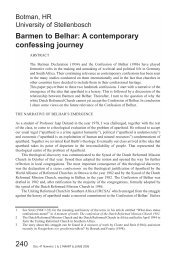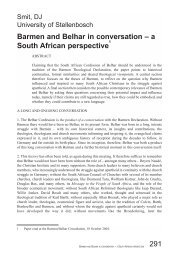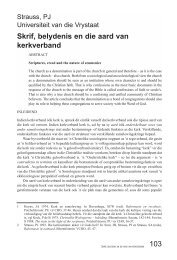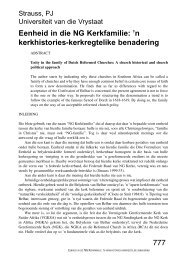The history of Belhar - Belydenis van Belhar
The history of Belhar - Belydenis van Belhar
The history of Belhar - Belydenis van Belhar
Create successful ePaper yourself
Turn your PDF publications into a flip-book with our unique Google optimized e-Paper software.
structurally unite with other churches in the family. In 1986 the DRMC took note <strong>of</strong> the fact thatvery little progress had been made on this important matter.<strong>The</strong> discussion on unity with the DRC mostly dealt with the declaration <strong>of</strong> the statusconfessionis and the acceptance <strong>of</strong> the draft-confession by the former DRMC in 1982. (ActaSynodi NGSK 1986:15-19; L<strong>of</strong>f, 1998:268).After the acceptance <strong>of</strong> the Confession <strong>of</strong> <strong>Belhar</strong> the DRMC once again continued thediscussion about church unification with the other members <strong>of</strong> the family <strong>of</strong> DR Churches. <strong>The</strong>RCA and the DRC were for various reasons, not very optimistic about this. However, the DRChurch in Africa did indicate its willingness to begin discussions on unification with the DRMC.Thus it happened that these two churches formed a discussion commission that negotiated thisimportant matter form 9 September 1987. <strong>The</strong> DRC and the RCA were continually and openlyinvited to these discussions. However, the RCA never responded to the invitations and the type <strong>of</strong>discussions between the DRC and the DRMC did not produce the hoped for results in the course<strong>of</strong> time – even after the intervention <strong>of</strong> the Reformed Ecumenical Synod in March 1989. <strong>The</strong>discussions on church unification between the DRCA and the DRMC were more successful. Aconvent was held in 1990 by the DRCA and the DRMC in <strong>Belhar</strong> (Cape Town) that wouldeventually result in church unification between the two churches in 1994. <strong>The</strong> original aim was forthe two churches unite in 1990. However, this could not take place yet since the DRCA had notyet accepted the Confession <strong>of</strong> <strong>Belhar</strong>. <strong>The</strong> alternative was that the DRMC give up the confessionwhich, however, did not happen as the DRCA finally accepted the <strong>Belhar</strong> Confession. <strong>The</strong> churchunification that was to take place in 1990 was finally celebrated with great joy and excitement on14 April 1994. This important event took place in the same church building where the Confession<strong>of</strong> <strong>Belhar</strong> was <strong>of</strong>ficially accepted in 1986. At the synod <strong>of</strong> the DRMC <strong>of</strong> 1994 a “unificationclause” was drawn up to ensure that the unification process would take place well and justly. <strong>The</strong>rewere about 45 ministers in the former DRMC who gave the impression that they were a ‘pressuregroup against church unification’ (ibid, 273). <strong>The</strong> synod <strong>of</strong> the DRMC appointed an “ad hoccommission for pastoral discussions” to openly assist persons in congregations in their “problems,fears, doubts and uncertainties” regarding the issue. This commission also proposed that suchmembers be treated as members <strong>of</strong> the DRMC and after unification as members <strong>of</strong> the URCSA.In Bloemfontein in 1997 the E<strong>van</strong>gelical Reformed Church in Africa joined the URCSA. <strong>The</strong>ERCA was a reformed church that was also established in Namibia by the DRC in 1975 (ActaSynodi VGKSA, 1997:427-428).6. WHAT IS THE POSITION OF THE CONFESSION OF BELHAR WITHIN THE FAMILY OFDR CHURCHES?<strong>The</strong> DRMC and the DRCA accepted the Confession <strong>of</strong> <strong>Belhar</strong> as their confession in 1994 whenthey united to form the URCSA. No other reformed church in this family has done the same. Withthe formation <strong>of</strong> the URCSA in 1994 part <strong>of</strong> the DRCA (Free State and Phororo Synods) did notsee their way open to accept the Confession <strong>of</strong> <strong>Belhar</strong>.<strong>The</strong> General Synod <strong>of</strong> the DRC in 1998 accepted, as it stated in Die Kerkbode <strong>of</strong> 8 October2004, the essential content (“wesenlike inhoud”) <strong>of</strong> the Confession <strong>of</strong> <strong>Belhar</strong> for the sake <strong>of</strong> theunification process, but wished to “not at the moment recommend it as a fourth confession”.<strong>The</strong> General Synod <strong>of</strong> the DRC in 2002 stated that provision must be made for the acceptance<strong>of</strong> the Confession <strong>of</strong> <strong>Belhar</strong> as confession for the new church, but in such a way that it serves theunification process in a positive way. This last phrase wanted to ensure that the confession not beenforced on its members. Even if accepted as confession, no church member or congregation mustbe forced to sign it.238 DEEL 47 NOMMERS 1 & 2 MAART & JUNIE 2006








